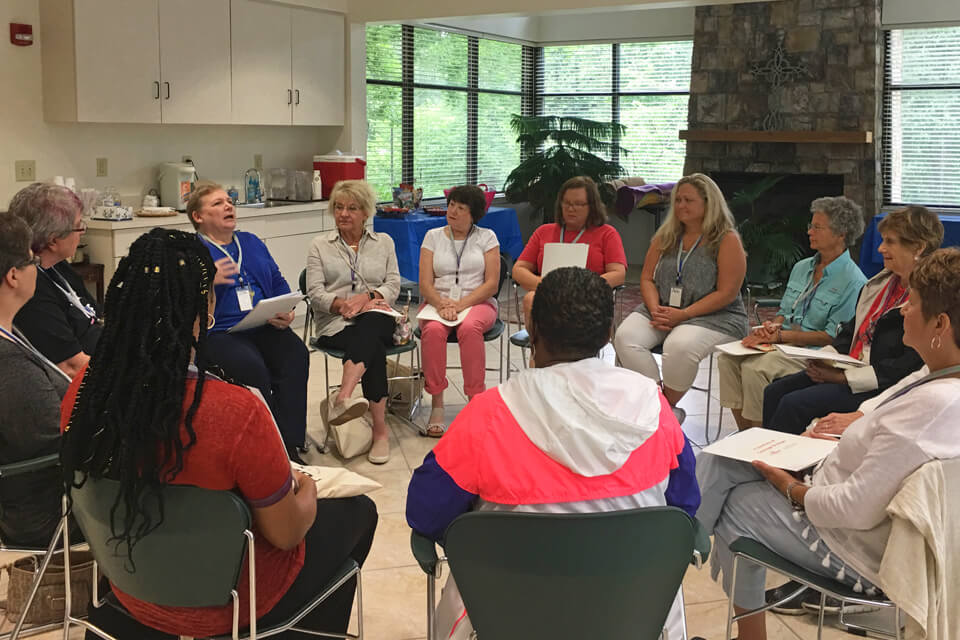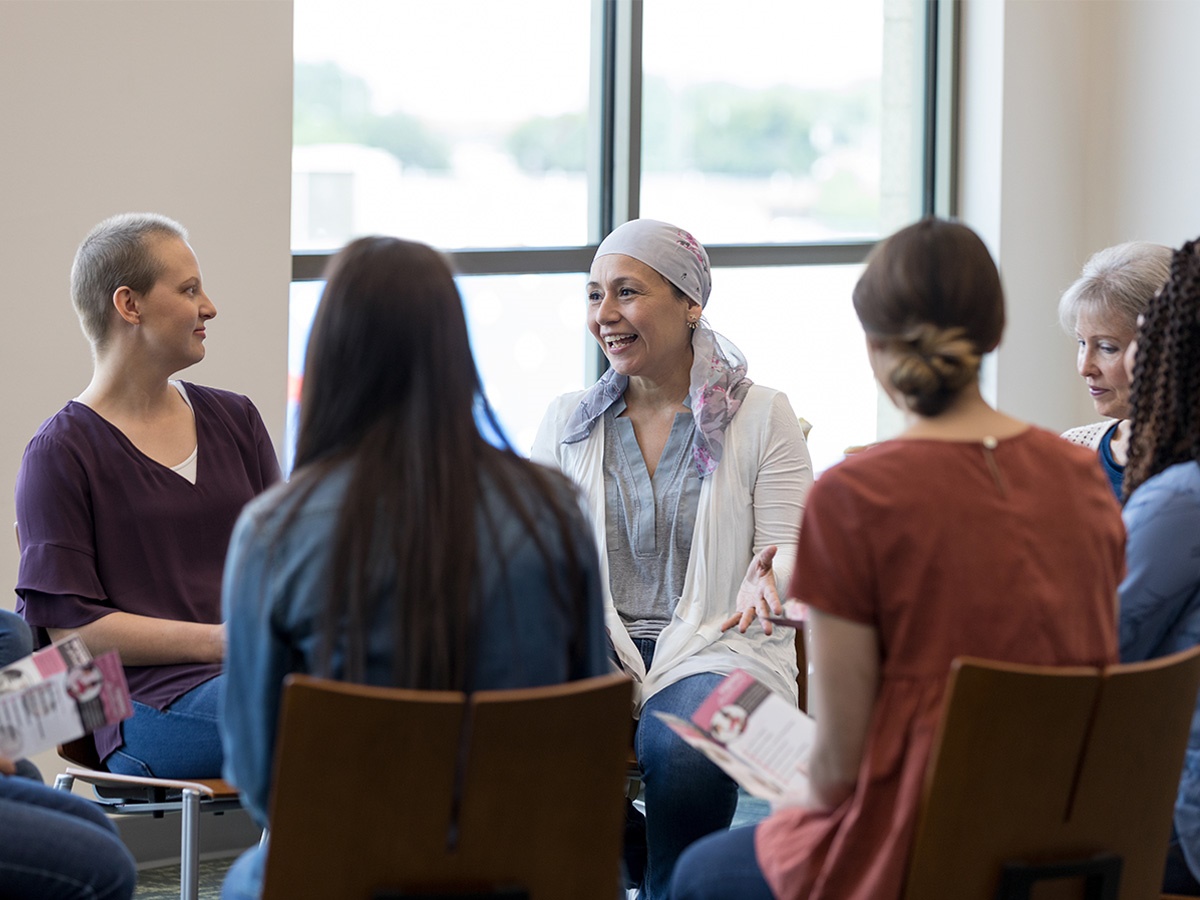
Scientific research has shown that support groups are highly beneficial for people living with cancer. Some reports say that participating in a support group can even improve treatment outcomes and greatly improve quality of life. Inadequate social support can have the opposite effect. Women in unhealthy relationships or those that are isolated from support have poorer health outcomes and a reduction in quality of life scores. This translates into higher rates of depression and anxiety in women lacking social support.
On the other hand, participating in a cancer support community can improve your mood and reduce pain, depression, and anxiety. Further, you have access to a rich resource of information about different treatment options and tips to make your life more comfortable during treatment. Science shows that participating in a breast cancer support group can help you follow through with chemotherapy treatments and have a healthier recovery. In this article, you will learn about the science behind the power of participating in support groups in improving the quality of life and health in women with breast cancer.
Background
You receive social support from your friends, family members, spouse or partner, children, caregivers, and community members. You also can connect in a social support system in a support group. Social support can be defined as an interpersonal transaction that involves:
- Empathy or emotional concern
- Physical help or service
- Information about the environment
- Appraisal or self-evaluation
A social support system is made up of personal connections (like friends and family members), links with your community (i.e., volunteer or church member), and your living status (single, cohabitating, or married).The more links you have to different aspects of a social support system (such as being a volunteer or having a close connection to your family) means you have a high level of support available to you and you are less likely to feel isolated or alone. Isolation and loneliness can lead to poor mental health, decreased quality of life, and cause health problems.
Depression and Anxiety Lifted by Social Support
In the past decade, treatment for breast cancer has significantly improved. This improvement has brought with it longer treatment periods that cause extensive physical and emotional side effects. During the course of treatment, many women find that their friends, family, and medical providers do not offer the support they need to cope with the emotional turmoil of living with a serious disease. Other women do not have stable relationships with their family or an unsupportive partner. Loneliness and isolation often follows along with increased psychological symptoms including depression and anxiety.
Research has shown that women with breast cancer and depression reported the following:
- More physical symptoms
- Increased impaired functioning
- Increased length of hospitalization
- Treatment interference
- Adversely affected quality of life

Oncology professionals agree that treating depression is an important component in the treatment regimen for breast cancer. Symptoms of depression and anxiety often subside in severity in women who regularly participate in a breast cancer support group. Current medical research from BYU has shown that medical patients who have healthy social support systems in place have an increased chance of survival and longer lifespan. Apart from support from family and friends, you receive encouragement from a support group to complete medical treatments and follow a healthier lifestyle.
Health Benefits of Social Connections
Human beings are a social species and historically our survival is dependent upon working together to avoid illness, obtain food and water, and be supported physically and emotionally. In other words, social support has a great influence on mental health which in turn influences physical health outcomes. When people feel supported in a healthy relationship with family and community members, responses to stress are improved and we are better able to take care of our minds and bodies.
There are several benefits of being connected in a healthy social support community, including:
- Increased self-esteem
- Relieves emotional distress
- Promotes enduring good mental health
- Improves your ability to handle stressful situations
- Promotes health lifestyle behaviors
- Lowers cardiovascular risk such as high blood pressure
- Encourages you to stick with your treatment plan
Social connections and support can influence your health in ways you never knew. Think of how much easier it is to go to a doctor’s appointment or follow up if a friend or family member goes with you. Or how many times a friend or loved one has told you to call the doctor when you are ill or in physical pain. Loved ones encourage us to call our medical provider and support us through our fears. However, sometimes this type of support is not enough and we need to reach out to someone who can understand our experience on a personal level.
Short-Term Beneficial Effects of Breast Cancer Support Groups
While breast cancer support groups may differ in their philosophies, types, settings, and approaches, they share in common using peer support as a means of guidance. These groups help to facilitate breast cancer patients adapt to physical and psychological effects of diagnosis and treatment.
Studies show that breast cancer support groups have near immediate beneficial effects for those who choose to join them. These short-term effects include:
- Reduced anxiety
- Decreased depression
- Better adjustment to cancer
- Lower levels of hopelessness and helplessness
- Improved coping style
Breast cancer support groups have been shown in studies to help participants overcome social isolation and not feel stigmatised by their diagnosis. Further, these groups offer their members the opportunity to discuss problems related to living with cancers while sharing their stories in a safe space.
Studies also show that women who belong to a breast cancer community have better psychological outcomes than those who do not belong to support groups. One aspect of improved mental health is the personality traits of optimism and pessimism. Research has shown that being an optimist has a beneficial effect on your health and well-being. But, we are not all optimistic, especially in the face of a serious diagnosis like cancer. Optimists and pessimists use different ways to cope with stress, with an optimist having the ability to use more coping strategies to manage their emotions. Pessimists are more likely to feel hopeless and helpless without effective coping strategies to manage overwhelming emotions. A support group can help those who tend to pessimism lift out of the hopelessness cycle and help them to adjust to the multiple stressors of living with breast cancer.
References
Bredal, S. (2014, May). Effects of a psychoeducational versus a support group intervention in patients with early-stage breast cancer. Cancer Nursing, 37(3), 198-207. Retrieved from Cancer Nursing: https://journals.lww.com/cancernursingonline/fulltext/2014/05000/Effects_of_a_Psychoeducational_Versus_a_Support.7.aspx?casa_token=axCUsxpv3A8AAAAA:5Hvvp4zDilWNV90aJyFqkwVzfdaj-WXRST523oQ7XBaJ7afDWucdZYAk44v8EEqTrSejERHYsMy-r79-Oh81o8tW
Carroll, M. (2020, March 17). New study suggests strong social support can improve cancer outcomes. Retrieved from National Foundation for Cancer Research: https://www.nfcr.org/blog/new-study-suggests-strong-social-support-can-improve-cancer-outcomes/
Klemm, P. (2002). Depression in internet and face-to-face cancer support groups: A pilot study. Oncology Nursing Forum, 29(4). Retrieved from ONF: https://onf.ons.org/onf/29/4/depression-internet-and-face-face-cancer-support-groups-pilot-study
Montali, L., et., al. (2021, August 06). Mirroring, monitoring, modelling, belonging, and distancing: Psychosocial processes in an online support group of breast cancer patients. Journal of Community Psychology, 1-16. Retrieved from Wiley Online Library: https://onlinelibrary.wiley.com/doi/pdf/10.1002/jcop.22696
Salakari, M., et., al. (2017, October). Social support and breast cancer: A comparatory study of breast cancer survivors, women with mental depression, women with hypertension and healthy female controls. Breast, 35, 85-90. Retrieved from PubMed: https://pubmed.ncbi.nlm.nih.gov/28667868/
Stahle, T. (2021, May 18). BYU research finds social support key to increasing medical patient survival rates. Retrieved from BYU: https://news.byu.edu/intellect/byu-research-finds-social-support-key-to-increasing-medical-patient-survival-rates***On the Aepios platform, members gain support from peers nationwide by sharing valuable real-world experiences, treatments, and outcomes for an expanding number of medical conditions.***


